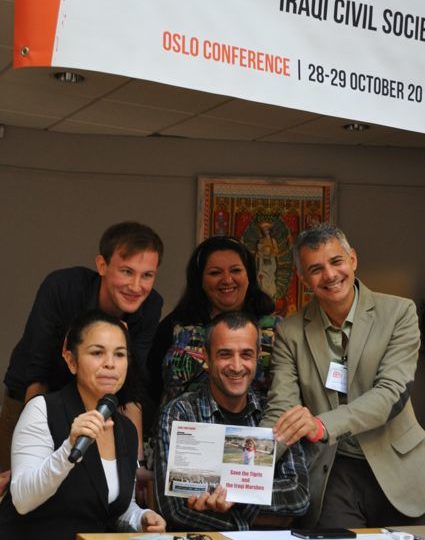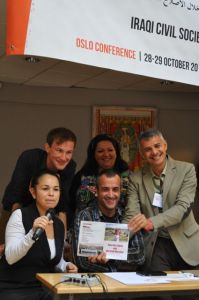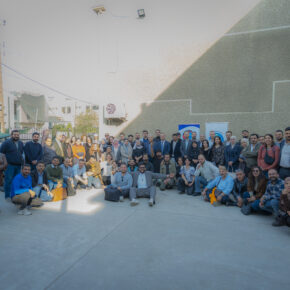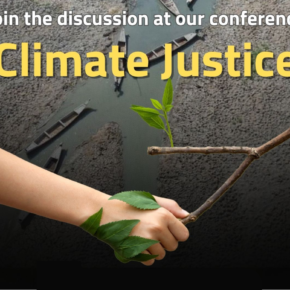Draught, and Misuse threaten the natural and cultural heritage, and the right of access to water for the inhabitants of Mesopotamia
Nadia Al Baghdadi,
A paper prepared for the ICSSI conference “”promoting dialogue and reconciliation, working for peaceful coexistence, and opportunities for international solidarity with Iraqi civil society” 27-29 Oct.2014, Oslo.
On the 14th of March 2012, a petition was released all over the world, directed to The World Heritage Committee of UNESCO, to conserve the natural and cultural world heritage of Tigris in Mesopotamia. This campaign was launched by four NGOs, from different parts of the Mesopotamia region, but it has expanded and now includes NGOs and activists from different parts of the world. The essence of the campaign is that Turkey is building a huge dam on the Tigris, only 65 Km upstream from the Iraqi borders. Aside from the catastrophic cultural and environmental impact of “Iliso” dam, it also violates the right to food, water, and the right to economic and social development for hundreds of thousands of people that live along the river, in both Iraq and Turkey. In addition, the current state of the Euphrates, on which there are already big dams, have resulted in problems with water levels and quality in Iraq and Syria. One might thus assume that the dams in Turkey will have a distinct and negative impact on the water in Syria, and Iraq and including Kurdistan region, thus undermining the the political stability in the region.
Since their inception, the Save Tigris and the Iraqi Marshes Campaign have adopted an advocacy policy which presses local authorities and institutions in Iraq to reopen dialogue with Turkey in order to set sustainable policies that will guarantee equitable shares of water for all riparian countries in accordance with the international laws and international customary laws. These laws rest on a principle of dialogue and partnership, which obliges any riparian country that desires to establish an infrastructure project along the river basin to coordinate with all affected countries.
The current political and security crisis in Iraq has caused water issues to be pushed to the margins of political discourse, to be postponed for later discussion. The newly formed Iraqi government has established no concrete, clear water policies. The campaign sees this avoidance as dangerous as the Iraqi water infrastructure is now exposed to armed threats from one or more of the parties to the current conflict, occurring in both Iraq and Syria. There is no telling who might resort to the use of water, and water infrastructure, as weapons to overpower or cripple an opponent.
Our campaign is against the deliberate manipulation of water as a tool for controlling events within any armed conflict. To use water in this punitive way is a direct violation of International Humanitarian Law: access to water is a fundamental human right, and water should not be used as weapon. The campaign also believes that it is necessary, to use all available means to avoid targeting humanitarian and cultural heritage sites on the banks of the Tigris.
The Save Tigris and the Iraqi Marshes Campaign calls up on all of the conflict parties to:
- Refrain from using water, and water infrastructure, as weapon in the current conflict.
- Guarantee access to water to all Iraqis.
With the formation of a new government in Iraq, the campaign would like to adopt a new strategy which takes into account the current political and security issues that Iraq now faces. This strategy has two basic aspects. The first is to establish agreements which set forth equitable shares of water for riparian states. These agreements should respect all international laws and international custmary law, and should set out a method of deliberation and decision-making between states which outlines precisely whether and how any project on the Tigris and Euphrates should be conducted. This implies therefore that there should be an immediate cessation of all construction operations on the Iliso dam until a decent environmental study as well as an impact assessment of the project is carried out.
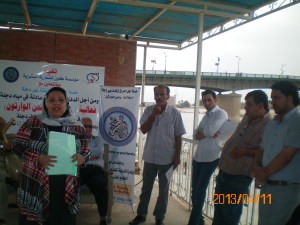
The second aspect is the provision of sufficient protection to the Iraqi water infrastructure. It should be developed and expanded so that it is compatible with development requirements and the increase in water consumption resulting from the increase in population. The infrastructure should follow sustainable policies, compatible with water scarcity resulting from climate change and global warming as well as other factors that have caused a decrease in water flow into Iraq, specifically, the policies of states which lie upstream.
In order to establish such a strategy, the STC is seeking to communicate with the related ministries of “Water Resources, Agriculture, State Department” and any other official entity when required.
One should note further that the levels of Tigris and Euphrates Rivers were drastically decreased over the past few years (as stated by the Ministry of Municipalities at the beginning of 2012). This was the result Turkey, Iran, and Syria decreasing the water flow into Iraq by cutting tributaries’ flow into the territory of Iraq or changing their courses altogether. These practices had a devastating impact on the Iraqi economy, of which the agricultural sector represents a large percentage. This also affected the water quality, and increased pollutants, salinity concentrations, and affected the environment and health of civilians

